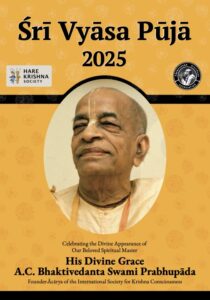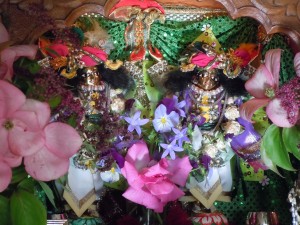Big Difference between a materialistic devotee and a pure devotee explained
SB 6..10.10-This body, which is eatable by jackals and dogs after death, does not actually do any good for me, the spirit soul. It is usable only for a short time and may perish at any moment. The body and its possessions, its riches and relatives, must all be engaged for the benefit of others, or else they will be sources of tribulation and misery.
PURPORT-Similar advice is also given in Śrīmad-Bhāgavatam (10.22.35): etāvaj janma-sāphalyaṁ dehinām iha dehiṣu prāṇair arthair dhiyā vācā śreya-ācaraṇaṁ sadā
“It is the duty of every living being to perform welfare activities for the benefit of others with his life, wealth, intelligence and words.” This is the mission of life. One’s own body and the bodies of his friends and relatives, as well as one’s own riches and everything else one has, should be engaged for the benefit of others. This is the mission of Śrī Caitanya Mahāprabhu.
SB 6.11.21 purport….Vṛtrāsura asked Indra to release his vajra, or thunderbolt. He was destined to be killed by the thunderbolt given by Lord Viṣṇu; there was no question of its being baffled. Therefore Vṛtrāsura requested Indra to release the thunderbolt immediately, and he prepared himself by fixing his mind at the lotus feet of Kṛṣṇa. A devotee is always ready to give up his material body, which is described herein as grāmya-pāśa, the rope of material attachment. The body is not at all good; it is simply a cause of bondage to the material world. Unfortunately, even though the body is destined for destruction, fools and rascals invest all their faith in the body and are never eager to return home, back to Godhead.
SB 6.11.22-Persons who fully surrender at the lotus feet of the Supreme Personality of Godhead and always think of His lotus feet are accepted and recognized by the Lord as His own personal assistants or servants. The Lord never bestows upon such servants the brilliant opulences of the upper, lower and middle planetary systems of this material world. When one possesses material opulence in any of these three divisions of the universe, his possessions naturally increase his enmity, anxiety, mental agitation, pride and belligerence. Thus one goes through much endeavor to increase and maintain his possessions, and he suffers great unhappiness when he loses them.
PURPORT-In Bhagavad-gītā (4.11) “As devotees surrender unto Me, I reward them accordingly. Everyone follows My path in all respects, O son of Pṛthā.” Both Indra and Vṛtrāsura were certainly devotees of the Lord, although Indra took instructions from Viṣṇu to kill Vṛtrāsura. The Lord was actually more favorable to Vṛtrāsura because after being killed by Indra’s thunderbolt, Vṛtrāsura would go back to Godhead, whereas the victorious Indra would rot in this material world. Because both of them were devotees, the Lord awarded them the respective benedictions they wanted. Vṛtrāsura never wanted material possessions, for he knew very well the nature of such possessions. To accumulate material possessions, one must labor very hard, and when he gets them he creates many enemies because this material world is always full of rivalry. If one becomes rich, his friends or relatives are envious. For ekānta-bhaktas, unalloyed devotees, Kṛṣṇa therefore never provides material possessions. A devotee sometimes needs some material possessions for preaching, but the possessions of a preacher are not like those of a karmī. A karmī’s possessions are achieved as a result of karma, but those of a devotee are arranged by the Supreme Personality of Godhead just to facilitate his devotional activities. Because a devotee never uses material possessions for any purpose other than the service of the Lord, the possessions of a devotee are not to be compared to those of a karmī.
SB 6.11.23 purport…. The special mercy for the unalloyed devotee is that the Lord saves him from hard labor to achieve the results of religion, economic development and sense gratification. Of course, if one wants such benefits, the Lord certainly awards them. Indra, for example, although a devotee, was not much interested in release from material bondage; instead, he desired sense gratification and a high standard of material happiness in the heavenly planets. Vṛtrāsura, however, being an unalloyed devotee, aspired only to serve the Supreme Personality of Godhead. Therefore the Lord arranged for him to go back to Godhead after his bodily bondage was destroyed by Indra. Vṛtrāsura requested Indra to release his thunderbolt against him as soon as possible so that both he and Indra would benefit according to their proportionate advancement in devotional service.
SB 5.24.22-The Supreme Personality of Godhead did not award His mercy to Bali Mahārāja by giving him material happiness and opulence, for these make one forget loving service to the Lord. The result of material opulence is that one can no longer absorb his mind in the Supreme Personality of Godhead.
PURPORT-There are two kinds of opulence. One, which results from one’s karma, is material, whereas the other is spiritual. A surrendered soul who fully depends upon the Supreme Personality of Godhead does not want material opulence for sense gratification. Therefore when a pure devotee is seen to possess exalted material opulence, it is not due to his karma. Rather, it is due to his bhakti. In other words, he is in that position because the Supreme Lord wants him to execute service to Him very easily and opulently. The special mercy of the Lord for the neophyte devotee is that he becomes materially poor. This is the Lord’s mercy because if a neophyte devotee becomes materially opulent, he forgets the service of the Lord. However, if an advanced devotee is favored by the Lord with opulence, it is not material opulence but a spiritual opportunity. Material opulence offered to the demigods causes forgetfulness of the Lord, but opulence was given to Bali Mahārāja for continuing service to the Lord, which was free from any touch of māyā.
Some Conclusions-What started me off for this one, was the first purport where Srila Prabhupada
tells us that…’…The body and its possessions, its riches and relatives, must all be engaged for the benefit of others, or else they will be sources of tribulation and misery.”
tells us that…’…The body and its possessions, its riches and relatives, must all be engaged for the benefit of others, or else they will be sources of tribulation and misery.”
How many of us think in this way that everything we have-including our relatives, children, etc must be engaged in the service of the Lord? And if we dont do this- is a source of misery ! Why misery? Krsna tells us in Bg-work done as a sacrifice for Vishnu must be done, otherwise it binds us to karma of this world.
For most, if we can just remain a devotee is something special, what to speak of engaging all we know, including friends and relatives in devotional service . I once told a devotee friend of mine, that when he goes to meet with his karmi friends, if he does not preach to them about Krsna, then he will be forced to listen to their gramya katha-only talk about this material world, hearing which,,contaminates a devotees mind. When we become conatminated by these people, we lose ground towards going to Goloka Vrndavana.
For most, if we can just remain a devotee is something special, what to speak of engaging all we know, including friends and relatives in devotional service . I once told a devotee friend of mine, that when he goes to meet with his karmi friends, if he does not preach to them about Krsna, then he will be forced to listen to their gramya katha-only talk about this material world, hearing which,,contaminates a devotees mind. When we become conatminated by these people, we lose ground towards going to Goloka Vrndavana.
One time my 5 brothers and sisters , who always wanted me to come to their yearly outings together and drink with them, eat meat with them, etc, I would always refuse these invitations. So finally about three years ago, they all arranged a meeting among themselves to come to my area of the USA-Seattle.Wa. Even though it is only 75 miles away, I didnt want to go there to meet up with them, So they arranged a meeting , all 5 of them, and my three kids as well, to come to our ashram-there finally they could “see” me. When they came, we introduced them to our Deities, fed them all Krsna prasadam, gave them all a Bhagavad gita, and sent them on their way, and called it …”another day”
damaghosa das


